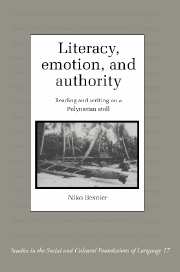Book contents
- Frontmatter
- Contents
- List of illustrations and tables
- Acknowledgments
- Transcription conventions and orthography
- 1 Introduction
- 2 The ethnographic context
- 3 The domains of reading and writing
- 4 Letter writing and reading
- 5 Letters, economics, and emotionality
- 6 Between literacy and orality: the sermon
- 7 Literacy, truth, and authority
- 8 Conclusion
- Notes
- References
- Index of Tuvaluan words
- General index
5 - Letters, economics, and emotionality
Published online by Cambridge University Press: 14 August 2009
- Frontmatter
- Contents
- List of illustrations and tables
- Acknowledgments
- Transcription conventions and orthography
- 1 Introduction
- 2 The ethnographic context
- 3 The domains of reading and writing
- 4 Letter writing and reading
- 5 Letters, economics, and emotionality
- 6 Between literacy and orality: the sermon
- 7 Literacy, truth, and authority
- 8 Conclusion
- Notes
- References
- Index of Tuvaluan words
- General index
Summary
Letter writing and reading are of relevance to several aspects of Nukulaelae social life. First, letters play an important role in monitoring economic exchanges between members of the community and the outside world. Second, letters are embedded in information-sharing networks, which weave in and out of orality and literacy and connect Nukulaelae people over large distances. Third, letters can carry moral messages that resemble in some respects the moral content of certain genres of face-to-face communication, but differ from them in other respects. Fourth, letters emerge as emotionally cathartic communicative events, a characteristic that colors all the other functions of letter writing. The social role that a particular letter plays depends in large part on the relationship of the writer and the addressee, and on whether the letter is sent to or from Nukulaelae. Furthermore, all letters, other than brief notes scribbled as the ship departs, straddle several functional categories: moral, economic, informational, and affective dimensions of letters are often inextricably interwoven with one another.
Letters and economic life
By far the most salient motive for writing letters is to monitor, record, stimulate, and control economic transactions associated with the exchange of gifts between Nukulaelae residents and their off-island relatives. As such, letter writing has become thoroughly incorporated into the socioeconomic life of the community and in the economic ties between the community and the rest of the world. Hand-delivered letters frequently accompany food baskets, packages, or gifts of money.
- Type
- Chapter
- Information
- Literacy, Emotion and AuthorityReading and Writing on a Polynesian Atoll, pp. 93 - 115Publisher: Cambridge University PressPrint publication year: 1995



